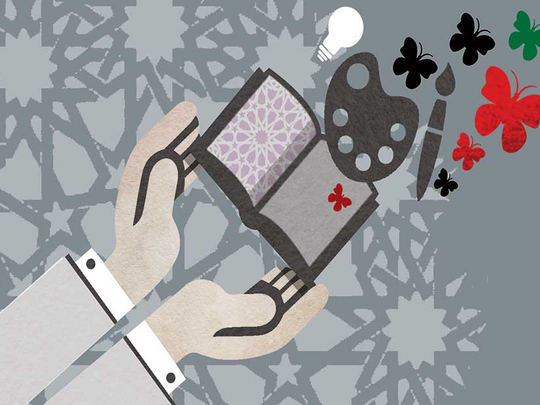
A few years ago during our family’s annual general meeting we voted to endow a chair for the American University of Sharjah in the name of my late father. The chair would officially be known as the Shaikh Saoud Bin Khalid Bin Khalid Al Qassimi Chair in Family Business. For those who don’t know, endowing a chair at an educational institution means that a sponsor (in this case my family business of which I am a small part) would fund a teaching position allowing the academic institution to hire a professor which it would otherwise not be able to. I hesitated as I write these lines on my flight from Chicago to Dubai to mention any value but let’s say it is in the lower eight digits in UAE dirhams. Today the two full AUS classes benefit from this chair which my nephew and I regularly visit. Students come from across the Middle East, the Asian Subcontinent and further afield learning about sustainability in family business across the generations.
Throughout the years my family business has donated to numerous programmes and causes in the UAE including the funding of mosques, an orphan programme and most recently were amongst the founding funders of the UAE Nation’s Fund.This is corporate social responsibility (CSR) and the operative word here is in the UAE. There are many examples of generous UAE corporates including Sunny Varkey, Al Ghurair Foundation, Majid Al Futtaim, Khalaf Al Habtoor et al. But in reality each time I see another of the expanding UAE millionaires list I wonder if they have given to causes in the UAE and most often than not I struggle to identify their projects. Is it the case that such individuals have given to UAE causes (and here I am writing specifically about UAE based causes) but have not announced them in public or have they benefitted from the social taboos of not speaking about charity and gotten away with not giving anything at all?
After all, there is a growing list of opportunities to contribute to. For instance the UAE federal government today and Abu Dhabi in particular is investing heavily in UAE soft power. It has supported the opening of museums such as the Louvre Abu Dhabi, the hosting of major events like Dubai Expo 2020 and lobbied to host the International Renewable Energy Agency. The UAE Ministry of Foreign Affairs and Cooperation has even tallied most of the charity the UAE has given abroad. But charity begins at home. And the UAE government’s efforts in raising the awareness of the UAE as a cultural and educational powerhouse in its pursuit to be “the Athens of the Arab world” as one senior official told me will be greatly complimented if corporates (owned by Emirati and non-Emiratis alike) also contribute.
Where are the private museums in the UAE for example? There are very few in fact. Whereas in China a museum opens every week (yes I realise the difference in population size) and the US is dotted with private initiatives (New York’s Museum of Modern Art was a private initiative) the same cannot be said for the UAE.
In Dubai the Women’s Museum, known as Bait Al Banat is an initiative by Emirati Professor Rafia Gobash and the Crossroads of Civilisations Museum which was established by collector Ahmad Al Mansouri stand out as great examples. Saudi Arabia’s Jameel family is funding the Jameel Arts Centre designed by Serie Architects while the Al Serkal Family commissioned OMA to design an art space named Concrete. In some instances perhaps an art patron can build a museum for their collection while others can propose to fund a project for an existing collection that has no permanent home. There are many other examples of collectors who have important items with no structure to host them in. Two current UAE cabinet ministers have important modern collections while a former speaker of parliament has a major collection of Arabic calligraphy. The list goes on. Wealthy philanthropists and corporations can partner with those who have artworks and build a project together. In the US tax deductions are given to wealthy donors who support cultural initiatives such as building a museum wing or donating art to the public. Perhaps the UAE government can consider similar tax deductions to individuals and corporates who contribute to the UAE’s development in the cultural, medical or academic fields. With the introduction of taxes in the UAE there is bound to be a larger degree of corporate transparency which will no doubt contribute to softening or even changing the social taboo of announcing gifts and donations. Ultimately, the social taboo should not be giving and not talking about it, the social taboo should be in not giving back to the country at all and getting away with it.
Sultan Sooud Al Qassemi is a UAE-based writer.









